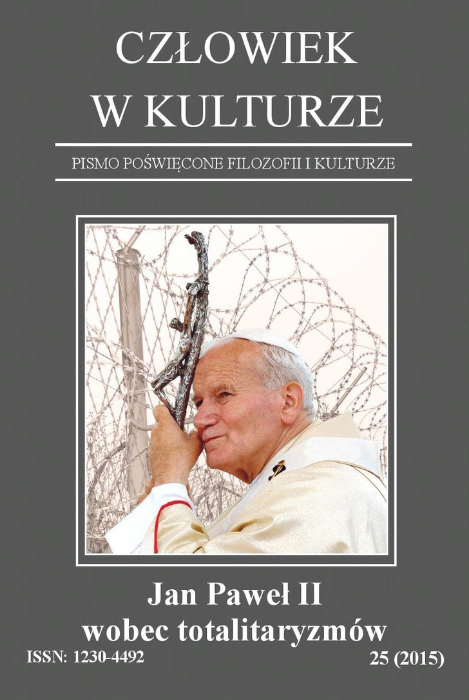Filozoficzno-kulturowe źródła totalitaryzmów XX wieku w ujęciu Jana Pawła II
Philosophical and cultural sources of the twentieth century totalitarianisms according to John Paul II
Author(s): Andrzej MaryniarczykSubject(s): Christian Theology and Religion, Philosophy, Political Philosophy, Social Philosophy, Theology and Religion
Published by: Fundacja »Lubelska Szkoła Filozofii Chrześcijańskiej«
Keywords: totalitarianism; ideology of evil; Nazism; Communism; liberalism; anthropological error; John Paul II
Summary/Abstract: In his interview, conducted by Fr. Józef Tischner and Krzysztof Michalski in Castel Gnadolfo and published in the book Memory and Identity, Pope John Paul II clearly indicates three types of twentieth century totalitarianisms, namely German Nazism, Soviet Communism and liberal (secular, atheistic) totalitarianism creeping in the contemporary Europe. The Pope and his interlocutors undertake an attempt to find out the sources of these totalitarianisms. What connects all these totalitarianims is the fact that they are built upon “ideologies of evil.” In the case of liberal (secular, atheistic) totalitarianism, however, the ideology of evil is in a certain sense “more subtle and hidden, perhaps, intent upon exploiting human rights themselves against man and against the family.” These totalitarianisms can be treated as paradigms of those which can be encountered in Europe, Russia, Asia, Africa and South America in the twenty first century. While totalitarianism can be analyzed from different aspects, e.g., from political, legal, economical, and also from social-cultural aspects, this article is focused on studying the latter aspect. The article begins with a question: in what does the evil of each ideology manifest itself? It manifests itself in the fact that the totalitarian system of social life, imposed on states and nations according to a determined ideology, turns against man as man. Totalitarian systems do not protect man, but use him. The article consists of three parts: 1) it distinguishes features of totalitarianism and the ways in which it manifests itself in social and cultural sphere; 2) it indicates the philosophical sources of totalitarianism described by John Paul II; 3) it points to the tasks indicated by the Pope for us to protect society against fatal consequences of totalitarianism.
Journal: Człowiek w Kulturze
- Issue Year: 2015
- Issue No: 25
- Page Range: 27-41
- Page Count: 15
- Language: Polish

